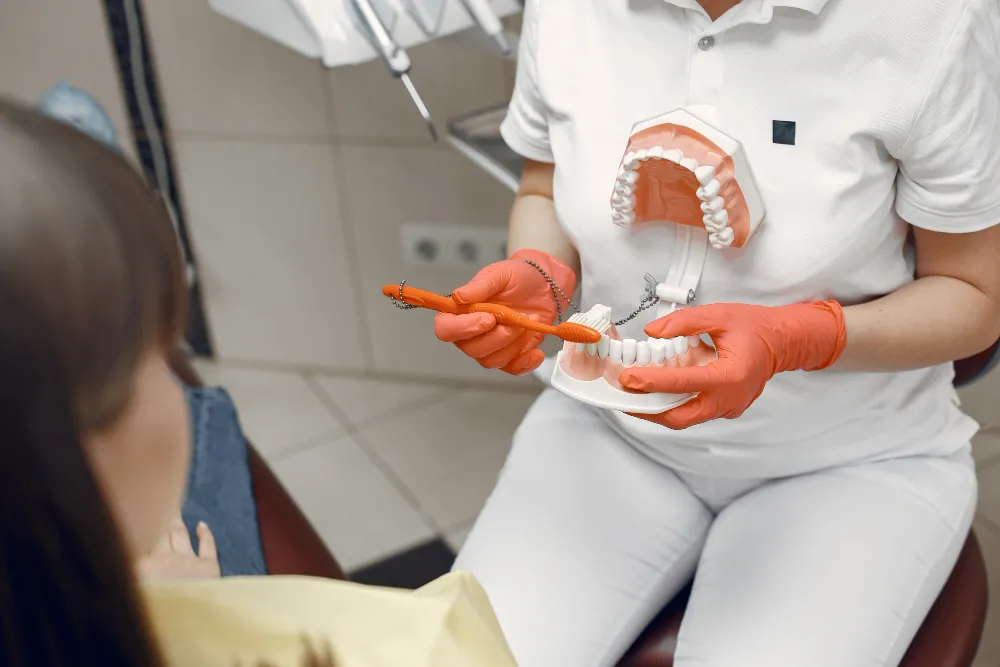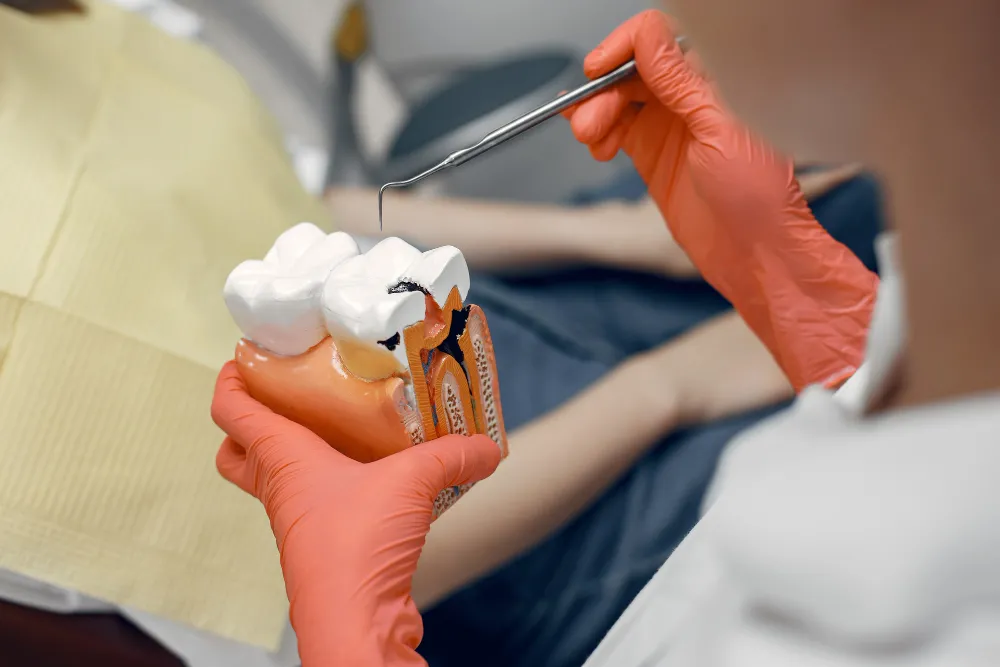Tooth Replacement Options: Bridges, Crowns, and Implants Explained
Losing a tooth can significantly impact both your appearance and the overall function of your smile. Whether due to injury, decay, or gum disease, missing teeth can make everyday tasks like eating and speaking more challenging and may lead to other oral health issues if left untreated. Fortunately, modern dentistry offers several effective tooth replacement options, including dental bridges, crowns, and implants. At Katy Lakes Dentistry, we are dedicated to helping you find the best solution for restoring your smile.
In this comprehensive guide, we’ll explore the key differences between these tooth replacement options, their benefits, and which option might be right for you.

Why Tooth Replacement Matters
Before diving into the specific options, it’s essential to understand why replacing missing teeth is so important. Beyond the cosmetic concerns, missing teeth can lead to several oral health issues, including:
- Shifting Teeth: When a tooth is lost, the surrounding teeth may shift out of place, leading to misalignment, bite issues, and further complications.
- Bone Loss: Teeth stimulate the jawbone, and when a tooth is missing, the bone can begin to deteriorate in that area. This can lead to changes in your facial structure and weaken the jaw over time.
- Difficulty Chewing and Speaking: Missing teeth can make it harder to chew certain foods or speak clearly, affecting your overall quality of life.
- Increased Risk of Tooth Decay and Gum Disease: Gaps left by missing teeth can trap food particles, making it harder to clean your mouth properly, increasing the risk of decay and gum disease.
Replacing missing teeth promptly is essential to maintaining the health, function, and aesthetics of your smile.
Tooth Replacement Options: Bridges, Crowns, and Implants
Let’s take a closer look at the most popular tooth replacement options offered at Katy Lakes Dentistry: dental bridges, crowns, and implants.
1. Dental Crowns
Dental crowns are tooth-shaped caps that are placed over a damaged or weakened tooth to restore its function, shape, and appearance. While crowns are not typically used for replacing a completely missing tooth, they are often part of the process when a tooth is severely damaged and needs additional support.
When Are Crowns Used?
- Severely Decayed or Damaged Teeth: If a tooth has extensive decay or damage that cannot be fixed with a filling, a crown may be used to restore its function.
- Root Canal Treatment: After a root canal, a crown is often placed to strengthen the tooth and protect it from future damage.
- Tooth Replacement with Implants: Crowns are also used to cover dental implants, acting as the visible part of the new replacement tooth.
Benefits of Dental Crowns:
- Durability: Crowns are made from strong materials like porcelain or metal, making them long-lasting and durable.
- Natural Appearance: Crowns are custom-made to match the color and shape of your natural teeth, blending seamlessly into your smile.
- Protection: Crowns protect damaged teeth from further decay, breakage, or infection.
2. Dental Bridges
A dental bridge is a restoration used to fill the gap left by one or more missing teeth. It consists of one or more false teeth (pontics) held in place by crowns on the adjacent teeth. Bridges are a fixed solution, meaning they are not removable like dentures.
When Are Bridges Used?
Bridges are commonly used when there are healthy teeth on either side of the gap left by a missing tooth or teeth. These adjacent teeth are crowned, and the bridge is anchored in place.
Types of Dental Bridges:
- Traditional Bridges: The most common type of bridge, supported by crowns on the adjacent teeth.
- Cantilever Bridges: Used when there is only one adjacent tooth to support the bridge.
- Maryland Bridges: This type uses metal or porcelain wings bonded to the back of adjacent teeth, rather than crowns.
Benefits of Dental Bridges:
- Improved Function: Bridges restore your ability to chew and speak properly by filling in the gap left by missing teeth.
- Aesthetic Appeal: Like crowns, bridges are custom-made to blend with your natural teeth, enhancing the appearance of your smile.
- Non-Surgical Solution: Unlike implants, bridges don’t require surgery, making them a less invasive option for some patients.
Limitations of Dental Bridges:
- Potential Impact on Adjacent Teeth: The adjacent teeth must be reshaped and crowned, which can affect their long-term health.
- May Not Last as Long as Implants: While durable, bridges typically don’t last as long as dental implants, especially if not properly cared for.
3. Dental Implants
Dental implants are considered the gold standard for tooth replacement because they mimic the natural structure of a tooth, including the root. A dental implant is a titanium post surgically placed into the jawbone, which serves as a sturdy foundation for a replacement crown. Implants are a permanent solution and provide a natural look and feel.
When Are Implants Used?
Implants are an excellent option for patients with missing teeth who are in good overall health and have sufficient jawbone density to support the implant. They can be used to replace a single tooth, multiple teeth, or even a full arch of teeth.
Benefits of Dental Implants:
- Long-Lasting and Durable: Implants are designed to last for decades, making them a permanent solution to tooth loss.
- Prevents Bone Loss: Implants stimulate the jawbone just like natural teeth, preventing bone deterioration.
- Natural Look and Feel: Implants function and look like natural teeth, restoring both your smile and bite function.
- Preserves Adjacent Teeth: Unlike bridges, implants don’t rely on neighboring teeth for support, allowing your adjacent teeth to remain untouched.
Limitations of Dental Implants:
- Surgical Procedure Required: Dental implants require minor surgery to place the titanium post, which may not be suitable for everyone.
- Longer Treatment Time: The implant process can take several months, as the post needs time to integrate with the jawbone before the crown can be placed.
- Higher Cost: While implants are more expensive upfront than bridges or crowns, their longevity often makes them a cost-effective solution in the long term.
How to Choose the Right Tooth Replacement Option for You
Selecting the right tooth replacement option depends on several factors, including your oral health, lifestyle, and budget. Here are a few considerations when deciding between dental bridges, crowns, and implants:
1. Oral Health
Your oral health plays a significant role in determining which option is best for you. If you have healthy teeth surrounding the gap, a bridge might be suitable. If you have strong bone structure and overall good health, implants could be a better choice.
2. Durability and Longevity
If you’re looking for a long-term solution, dental implants are the most durable option, offering a permanent solution with proper care. Crowns and bridges are also durable but may need replacement or repair over time.
3. Cost
Crowns and bridges are typically more affordable upfront compared to implants, but implants offer a longer-lasting solution that could be more cost-effective in the long run. Our team at Katy Lakes Dentistry can help you explore financing options to make any treatment more affordable.
4. Aesthetic and Functional Goals
If you’re looking for a solution that closely mimics the look and feel of a natural tooth, implants are often the best choice. Bridges and crowns are still highly effective at restoring function and appearance, but they come with different considerations depending on the condition of your surrounding teeth.

Why Choose Katy Lakes Dentistry for Tooth Replacement?
At Katy Lakes Dentistry, we understand that every patient’s situation is unique, and we’re committed to helping you choose the best tooth replacement option for your needs. Whether you’re considering a crown, bridge, or dental implant, our experienced team will work with you to create a customized treatment plan that restores your smile and confidence.
Schedule Your Consultation Today!
If you’re missing a tooth and are ready to explore your tooth replacement options, contact Katy Lakes Dentistry to schedule a consultation. Our team will assess your oral health and help you determine whether a crown, bridge, or dental implant is right for you.
Call us at (832) 913-1772 or visit our website to book your appointment and take the first step toward a healthier, more complete smile.